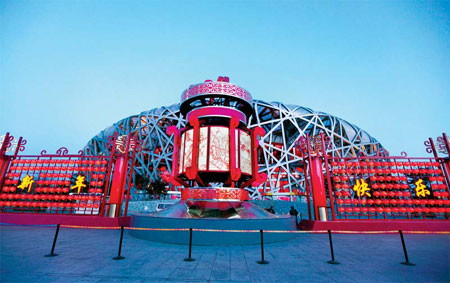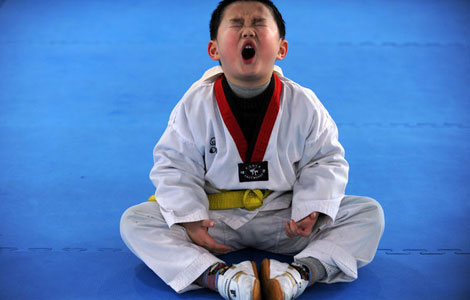Olympic venues could be 'white elephants' without more revenue
Updated: 2012-01-16 10:00
By Wang Wen (China Daily)
|
|||||||||||
|
Beijing's Bird's Nest stadium. Many arenas in the city that hosted the 2008 Olympic Games are exploring flexible commercial solutions to fund maintenance and avoid losses. [Photo/China Daily] |
BEIJING - More than three years after the 2008 Olympic Games, managers of Beijing's Olympic landmarks are desperately exploring new ways to profit from them in order to avoid financial woes.
The most recent concern is the Water Cube, where American swimmer Michael Phelps snatched a record number of eight gold medals during the international competition. Enthusiasm for the bubble-like architectural wonder has continued to decline, with the number of visitors falling by almost a third in 2011 compared with 2010.
Due to an underperformance in projected revenues and the burden of holding public assemblies on behalf of the government, the Beijing National Aquatics Center Co Ltd, the government-owned company that runs the venue, said it was 11 million yuan ($1.74 million) short in balancing its books last year.
The venue's commercial income was about 88 million yuan in 2011, while the cost of operation was about 99.29 million yuan.
But Yang Qiyong, deputy manager of the company, said the Water Cube was not in the red because it had other income, such as government funding for some water sports that helped it to make up the shortfall.
At the annual meeting of national sports officials in late December, Yang drew attention to the need to keep the expensive venue going. It cost about 1 billion yuan to build in 2008 and has required 57 million yuan annually in basic running costs in the post-Olympic years.
Yang's company has renovated the Olympic venue twice during the past three years but failed to lure more visitors. Despite it's hosting of some large sports events and art performances the venue is still unable to break even, according to its operator.
Financial problems are not just pressing on the Water Cube. The number of visitors to the main Olympic arena, the Bird's Nest, also declined by almost 50 percent in the first six months of 2011 compared with the same period in 2010. The operating team has to aggressively look for commercial options to fill that gap, although ticket sales still account for half of the arena's revenue.
Lin Xianpeng, vice-dean of the College of Management at Beijing Sport University, said it is not surprising for main Olympic venues to see visitor numbers decline four years after the Olympic Games. The venues should search for multiple business models to support themselves, he said.
For the Water Cube, the sale of its branded bottled water, liquor and souvenirs has become a new growth industry, bringing in about 40 million yuan for the company in 2011. The management team also partnered with a private entertainment company to stage year-round shows at the venue to net profits, and plans to open the competition pool and training facilities for swimmers who would be charged admission.
But these humble sales may still fall short of the sum needed to keep the lights on at the eye-catching center.
Xiang Jun, deputy manager of the National Stadium Co Ltd, which runs the Bird's Nest, said it is changing its role from that of a venue provider to a content provider by organizing more programs.
The biggest channel through which it would maximize revenues is commercial operations, which would include naming rights, a type of sponsorship that was initially discouraged by the government for fear of over-commercialization.
Interest in naming the Water Cube and Bird's Nest stadium has been high since the end of the Beijing Olympics, but formal discussions have never started, because of the government's reluctance. "This is the 'national' stadium, so the venue should not be too commercialized," said Xiang.
But "non-tangible" business development is important if large sports venues are to succeed financially, experts said.
"Whether these business developments can be successful will determine the fate of Olympic venues both in China and elsewhere in the world," said Lin Xianpeng.
The main venue of the 2000 Sydney Olympics was under-performing in financial terms until Telstra Corp Ltd, Australia's major telecommunications group, purchased the naming rights, the expert added. The commercial revenue from sports venues also includes such things as parking fees and all manner of VIP services.
However, Beijing's Olympic venues are still far from finding the right business models, venue operators said.
The only Beijing Olympic venue that is commercially named is the Beijing Olympic Basketball Gymnasium, which has been the MasterCard Center since January 2011. The venue hosted about 70 commercial events in 2011, an increase of 60 percent on 2010.
The center's income comes primarily from sponsorship, according to Anschutz Entertsinment Group (AEG), one of the world's leading sports and entertainment presenters, which operates the MasterCard center. About 70 percent of the center's profits come from sponsorship, including fees from naming rights and founding partnerships, said John Cappo, president and chief executive officer of AEG China.
Because there is little ancillary income from parking fees and food and beverage sales, merchandise sponsorship and arena rental account for most of its income, he said.
"We do not have the many other revenue sources in China that exist in the US or UK," Cappo said.
Experts agreed that only by exploring more flexible and diverse commercial solutions can these venues escape from becoming white elephants.
Related Stories
Economist: Olympic hangover impossible 2008-08-04 11:41
Olympic fever on the head 2008-08-11 13:04
Grandparents welcome the Olympic Games 2008-08-08 16:28
Olympics-friendly payment environment satisfying 2008-08-15 17:43
- Saudi oil refinery deal shows close ties
- Having the bottle to invest in red wine
- Olympic venues could be 'white elephants' without more revenue
- Down at heel, not down in the dumps
- China considers expanding RQFII program: report
- Weather puts rail system to test
- Crucial year looms for global economy
- In love with luxury amid global gloom









